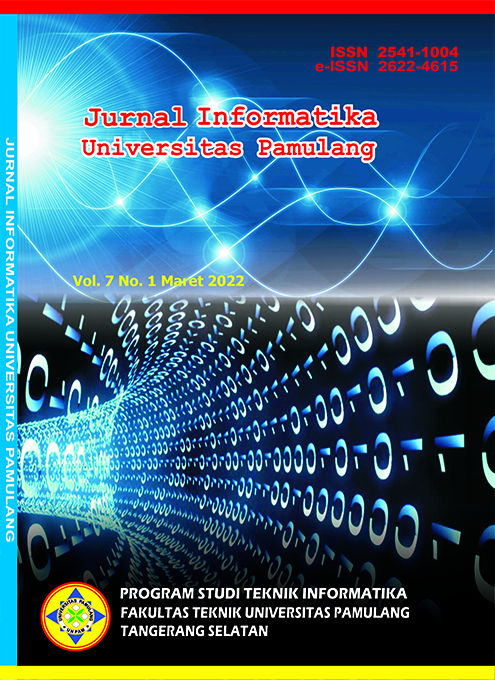Pengujian Aplikasi Sistem Informasi Akademik Berbasis Website Menggunakan Teknik Equivalence Partitioning dan Metode Black Box
DOI:
https://doi.org/10.32493/informatika.v7i1.17528Keywords:
Black Box Testing, Information System Testing, Equality Partition, Information system application testingAbstract
This academic information system still has shortcomings in the data validation process, which will cause the data stored in the database not to match the desired data. Then it is proposed to test using the Black Box method with Equivalence Partitioning Techniques as a whole regarding the use, benefits, and results obtained from using the software. Black-box testing is a very important testing technique because it can identify errors in functions, interfaces, sample data, and access to external data sources. in implementation there are sometimes problems with testers who are not sure whether the software actually passes the test. in this implementation, the software that will be tested using black box testing is a website-based academic information system. Equivalence Partitioning Techniques discusses testing in the validation aspect of input data in terms of valid classes. From this research, it can be concluded that testing the level of accuracy of academic issues system software can provide the right solution for the school.References
Hanifah, U., Alit, R., & Sugiarto. (2016). Penggunaan Metode Black Box Pada Pengujian Sistem Informasi Surat Keluar Masuk. Jurnal Universitas Pembangunan Nasional, XI(2), 33-40.
Hendri., Manurung, Hasiholan, Wlter, Jimmi., Ferian, Audi, Rifqi., Hanaatmoko, Faharrudin, Wahyu., Yulianti. (2020). Pengujian Black Box pada Aplikasi Sistem Informasi Pengelolaan Masjid Menggunakan Teknik Equivalence Partitions. Jurnal Teknologi Sistem Informasi dan Aplikasi, V(3) 107-113.
Jaya, Kesuma, Anwar, Syah, Misbah., Gumilang, Pandu., Tresnawati., Andersen, Philipus, Yohanes., & Desyani, Teti. (2019). Pengujian Black Box pada Aplikasi Sistem Penunjang Keputusan Seleksi Calon Pegawai Negeri Sipil Menggunakan Teknik Equivalence Partitions. Jurnal Informatika Universitas Pamulang, V(4) 131-136.
Komarudin. (2016). Pengujian Perangkat Lunak Metode Black Box Berbasis Equivalence Partitions Pada Aplikasi Sistem Informasi Sekolah. Jurnal Mikrotik, 1-2.
Krismadi, Adi., Lestari Fisca Ana, Pitriyah, Anisah., Mardangga, Ardhie Putra Wayan I., Astuti, Muji., & Saifudin, Aries. (2019). Pengujian Blck Box Berbasis Equivalence Partitioning Pada Aplikasi Seleksi Promosi Jabatan. Jurnal Teknologi Sistem Informasi dan Aplikasi, V(2), 155-161
Muslimin, D. B., Kusmanto, D., Amilia, K. F., Ariffin, M. S., Mardiana, S., & Yulianti. (2020). Pengujian Black Box pada Aplikasi Sistem Informasi Akademik Menggunakan Teknik Equivalence Partitioning. Jurnal Informatika Universitas Pamulang, V(1), 19-26.
Ningrum, F. C., Suherman, D., Aryanti, S., Prasetya, H. A., & Saifudin, A. (2019, Desember). Pengujian Black Box pada Aplikasi Sistem Seleksi Sales Terbaik Menggunakan Teknik Equivalence Partitions. Jurnal Informatika Universitas Pamulang, IV(4), 125-130.
Priyaungga, Aji, Bayu., Aji, Bayu, Dwi., Syahroni, Mukron., Aji, Sukma, Tri, Nurul., & Saifudin, Aries. (2020). Pengujian Black Box Pada Aplikasi Perpustakaan Menggunaka Teknik Equivalence Partitions. Jurnal Teknologi Sistem Informasi dan Aplikasi, V(3) 150-157
Shadiq, J., Safei, A., & Loly, R. W. (2021). Pengujian Aplikasi Peminjaman Kendaraan Operasional Kantor
Menggunakan BlackBox Testing. Information Management for Educators and Professionals, V(2), 97-110.
Wijaya, Y. D., & Astuti, M. W. (2021). Pengujian Blackbox Sistem Informasi Penilaian Kinerja Karyawan Pt Inka (Persero) Berbasis Equivalence Partitions. Jurnal Digital Teknologi Informasi, 22-26.
Downloads
Published
Issue
Section
License
Authors who publish with this journal agree to the following terms:
- Authors retain copyright and grant the journal right of first publication with the work simultaneously licensed under a Creative Commons Attribution-NonCommercial 4.0 International (CC BY-NC 4.0) that allows others to share the work with an acknowledgement of the work's authorship and initial publication in this journal.
- Authors are able to enter into separate, additional contractual arrangements for the non-exclusive distribution of the journal's published version of the work (e.g., post it to an institutional repository or publish it in a book), with an acknowledgement of its initial publication in this journal.
- Authors are permitted and encouraged to post their work online (e.g., in institutional repositories or on their website) prior to and during the submission process, as it can lead to productive exchanges, as well as earlier and greater citation of published work (See The Effect of Open Access).
Jurnal Informatika Universitas Pamulang have CC-BY-NC or an equivalent license as the optimal license for the publication, distribution, use, and reuse of scholarly work.
In developing strategy and setting priorities, Jurnal Informatika Universitas Pamulang recognize that free access is better than priced access, libre access is better than free access, and libre under CC-BY-NC or the equivalent is better than libre under more restrictive open licenses. We should achieve what we can when we can. We should not delay achieving free in order to achieve libre, and we should not stop with free when we can achieve libre.
Jurnal Informatika Universitas Pamulang is licensed under a Creative Commons Attribution-NonCommercial 4.0 International (CC BY-NC 4.0)
YOU ARE FREE TO:
- Share : copy and redistribute the material in any medium or format
- Adapt : remix, transform, and build upon the material for any purpose, even commercially.
- The licensor cannot revoke these freedoms as long as you follow the license terms





